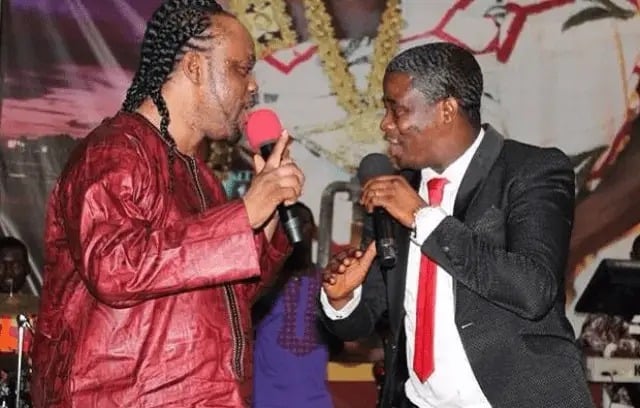Archbishop Adonteng Boateng, a Ghanaian American theologian, preacher, and philanthropist, recently shared insights into his role in reconciling two prominent figures in the Ghanaian music industry: Gospel musician Isaiah Kwadwo Ampong, known as Great Ampong, and Highlife legend Charles Kwadwo Fosu, affectionately called Daddy Lumba. During an interview with Kingdom FM, monitored by MyNewsGh.com, Archbishop Boateng emphasized the biblical imperative of seeking forgiveness when offending one another. He highlighted the importance of leading Great Ampong to offer a sincere apology to Daddy Lumba, emphasizing that such actions are crucial for spiritual elevation and embody the essence of Christianity. Boateng’s involvement stemmed from his desire to cleanse Great Ampong spiritually and fulfill his duties as a man of God.
The tension between Great Ampong and Daddy Lumba stems from their collaboration in 2015, which resulted in the joint album titled “Hosanna.” This project included eight tracks, with Ampong claiming to have written six of them. The collaboration was initiated when Daddy Lumba reached out to Ampong for a music project, and it featured popular songs like “Father and Son,” “Hosanna,” and “Jesus is a Winner.” Although the album garnered positive reception at its launch, the relationship between the two musicians soured afterward. Great Ampong alleged that following the album’s release, Daddy Lumba took all the proceeds from the event without sharing any with him, leading to feelings of betrayal and discontent.
In 2023, after years of conflict, Great Ampong’s heartfelt apology to Daddy Lumba marked a significant turn in their relationship. This act of contrition aimed to mend their fractured ties and restore harmony within the industry. However, the public response to this apology was mixed, with some people questioning whether Archbishop Boateng had coerced Ampong into making the public acknowledgment. The controversy surrounding the apology highlighted how reconciliation processes can be perceived and scrutinized by the public, especially when high-profile individuals are involved. It raised discussions about personal agency and the influence that spiritual leaders may exert over their followers.
Archbishop Boateng defended his actions in a subsequent interview, clarifying that his intention was to guide Great Ampong towards spiritual purity and readiness for his ordination. He asserted that his role was not one of coercion but rather one of support and guidance in the context of Christian values. By facilitating the apology, Boateng aimed at ensuring that Ampong could move forward in his spiritual journey without the burdens of unresolved conflict or guilt from past grievances. He reiterated that true Christianity involves humility, forgiveness, and the willingness to make amends where necessary.
The reconciliation between Great Ampong and Daddy Lumba serves as a reminder of the complexities often present in relationships, especially within the competitive landscape of the music industry. It reinforces the notion that disagreements and conflicts can arise even in collaborative settings, such as joint musical projects. The impact of these relationships not only affects the individuals involved but also resonates with fans and supporters, who often have emotional investments in their favorite artists. Therefore, public apologies and reconciliations can carry substantial weight in shaping public perceptions and restoring faith among the followers of these artists.
In conclusion, Archbishop Adonteng Boateng’s efforts to mediate peace between Great Ampong and Daddy Lumba underscore the delicate nature of human relationships and highlight the values of forgiveness and humility in Christianity. While the public may speculate on the dynamics of such reconciliations, it remains essential to recognize the profound emotional and spiritual work often involved in repairing fractured relationships. This incident serves as a valuable lesson on the significance of taking responsibility for our actions, seeking forgiveness, and the powerful potential for reconciliation when guided by compassion and understanding. Through this lens, the story of Ampong and Daddy Lumba evolves beyond mere celebrity drama, becoming an illustration of the broader human experience and the ongoing quest for connection and harmony in our lives.














